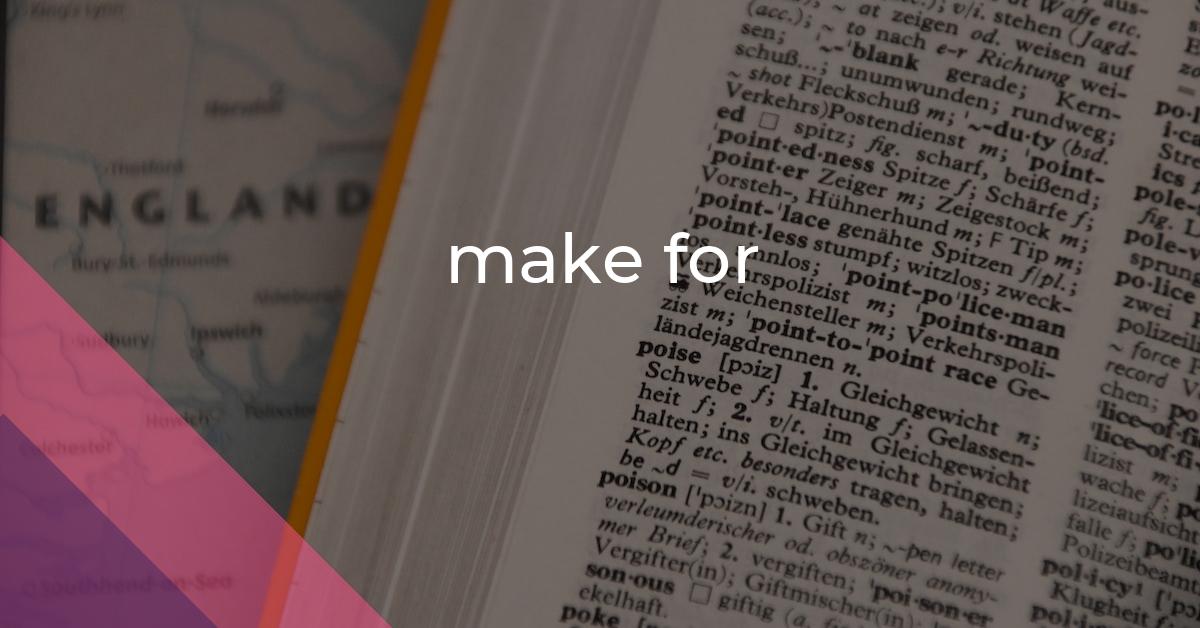make for: Idiom Meaning and Origin
What does ‘make for’ mean?
The idiom "make for" means to move or go in the direction of something or someone. It can also mean to contribute to or result in a particular outcome or situation.

Idiom Explorer
The idiom "stand in for" means to act as a substitute or replacement for someone or something, often temporarily. It implies taking on the role or responsibilities of another person or object.
The idiom "put to work" means to utilize or employ someone or something for a particular purpose or task.
The idiom "put forward" means to propose or suggest something for consideration or discussion. It is often used when presenting an idea, argument, or opinion in a formal setting or during a meeting.
The idiom "put down for" means to allocate or designate someone for a particular task or responsibility.
The idiom "play a part" means to have a role or contribute to a particular situation or outcome.
"Pave the way" means to make preparations or create conditions that will make it easier for something to happen or someone to achieve success.
The idiom "pave the road to hell" means that even though someone may have good intentions, their actions or decisions can ultimately lead to negative consequences or harm.
The idiom "par for the course" means that something is typical or expected in a given situation.
The idiom "now for" means it is time to focus on or address a specific issue or task immediately.
The idiom *make the weather* means to have a significant impact or influence on a situation or to be in a position of power and control.
The Symbolic Path
The idiom "make for" is a commonly used expression in the English language. It has various meanings and can be used in different contexts. The specifics of this idiom can be elucidated by examining related idioms that expand on its meaning.
First and foremost, "make for" is a phrasal verb that combines the verb "make" with the preposition "for." This combination creates a new meaning that cannot be deduced from the individual words alone. The verb "make" in this idiom implies causing or facilitating something, while the preposition "for" indicates a direction or purpose.
One of the related idioms that shed light on the meaning of "make for" is "made for each other." This idiom suggests a perfect match or compatibility between two people or things. It implies that they were specifically created or designed to be together. It is often used to describe a harmonious romantic relationship or a perfect pairing of any kind.
Another related idiom is "make it," which means to achieve success or reach a particular goal. It implies the overcoming of obstacles or challenges and can be used in various contexts. For example, when someone says, "I worked hard and finally made it," they are expressing that they have achieved their desired outcome.
"make a move" is another idiom related to "make for." It means to take action or make a decisive step in a situation. It can refer to making a bold move, making a strategic decision, or initiating a plan. For instance, someone might say, "If you want to succeed, you have to make a move and take risks."
Similarly, "make a difference" is an idiom that relates to "make for." It means to have a positive impact or bring about a significant change. It implies that one's actions or contributions can lead to meaningful results. For example, when someone says, "Volunteering at the shelter can make a difference in people's lives," they are highlighting the potential for positive change.
Lastly, "make happen" is another idiom that is connected to "make for." It means to cause or bring about a specific event or outcome. It suggests taking the necessary actions to ensure that something occurs or becomes a reality. For instance, if someone says, "We need to come up with a plan to make this event happen," they are emphasizing the importance of taking proactive steps to make the event a success.
Understanding the related idioms "made for each other," "make it," "make a move," "make a difference," and "make happen" provides further insight into the versatility and significance of the idiom "make for." It expands on the notions of compatibility, success, action, impact, and causation that are conveyed by this commonly used expression.
Example usage
Examples of how the idiom "make for" can be used in a sentence:
- Her quick and efficient actions made for a successful project completion.
- Weather conditions made for a challenging drive through the mountains.
- The comfortable seating and pleasant ambiance made for a great dining experience.
"Make for" is used in these examples to express the idea of contributing to or resulting in a particular outcome or situation. In the first example, the person's actions led to a successful project completion. In the second example, the weather conditions created a challenging drive. The third example showcases how the comfortable seating and pleasant ambiance resulted in a positive dining experience.
More "Verb" idioms



